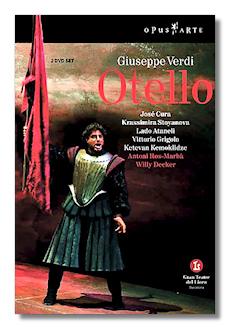
The Internet's Premier Classical Music Source
Related Links
- Verdi Reviews
- Latest Reviews
- More Reviews
-
By Composer
-
Collections
DVD & Blu-ray
Books
Concert Reviews
Articles/Interviews
Software
Audio
Search Amazon
Recommended Links
Site News
 DVD Review
DVD Review
Giuseppe Verdi

Otello
- José Cura (Otello)
- Krassimira Stoyanova (Desdemona)
- Lado Ataneli (Iago)
- Vittorio Grigòlo (Cassio)
- Vicenç Esteve Madrid (Roderigo)
- Giorgio Giuseppini (Lodovico)
- Ketevan Kemoklidze (Amelia)
- Francisco Santiago (Montano)
Symphony Orchestra & Chorus of the Gran Teatre del Liceu/Antoni Ros-Marbà
Opus Arte OA0963D 2DVDs 151minDTS DD Anamorphic Widescreen
This Otello comes to us from Barcelona, and was directed by Willy Decker, who might be most famous now for the Salzburg Netrebko/Villazón Traviata released on DVD in 2006 by Deutsche Grammophon. In that production, the central image was a gigantic clock, representing the time that was quickly running out for Violetta. Here, it is an elongated white (!) cross, nominally representing Venetian society, but also representing the cross on which both Otello and Desdemona are figuratively crucified. In fact, at the end of Act Two, Otello snaps it in half, and it remains on stage for the rest of the opera, including during the last moments of Desdemona's life, when she reverently tries to put it back together again. Subtle? No, but it is an effective symbol, and dramatically correct. (The mute commedia dell'arte players, who also represent Venice, I suppose, are considerably less effective, but Decker thankfully does not insist on them.)
In terms of visual design, there is no clutter at all in this Otello, whose treacherously raked stage and encroaching side walls create an atmosphere of peril and claustrophobia. This is intensified in Act Three by the introduction of a large mirror. The chorus is dressed completely in white, and even their faces are whitened, which I suppose is better than an Otello in obvious blackface! Decker does permit himself a minor "Zeffirelli-ism," if you will, by having the drunken Cassio literally lose his shirt in the first act, revealing tenor Vittorio Grigòlo's smooth chest, and a gym-built pair of pecs!
Cura and Stoyanova carry the musical aspects of this production. Cura is an intelligent singer and a fine actor, and his voice has the proper weight for this role, even though he chooses to emphasize Otello's pathos over his strength. He plays a little loose with the score from time to time, and sometimes he slides between notes a little more than I would like, but I wonder how many of today's tenors could outdo what he does here. Stoyanova is no less intelligent as Desdemona, and she sings with warmth, strength, and great control, particularly in her paired arias in the final act. Surely they would have stopped the show, if the conductor had allowed it to be stopped! These two singers have good chemistry together as well. On the other hand, Ataneli is a lightweight, unconvincing Iago, and none of the other cast members make much of an impact either, except for Grigòlo (and not just for his pecs!) and the Emilia, Ketevan Kemoklidze, who is a strikingly beautiful young woman – too good for Iago, to be sure! Ros-Marbà glides over the surface of the score creating too little atmosphere and almost as little drama. The chorus and orchestra have their thin and ragged moments too. None of this is fatal, but this Otello works best when it centers on Cura and Stoyanova, which, thanks to Verdi, it can do most of the time.
The bonus features are a five-minute introduction (including some interesting comments from Cura), and a five-minute plot synopsis. Acts One and Two are given without pause on the first DVD. Similarly, Acts Three and Four are performed without pause on the second. The widescreen image and sound (stereo and Digital DTS surround) are as fine as you will experience anywhere, and the English subtitles are mostly better than adequate, except in concerted passages.
This, then, is not the Otello of one's dreams, but the contributions of Decker, Cura, and Stoyanova are such that it is highly desirable nonetheless.
Copyright © 2007, Raymond Tuttle




















